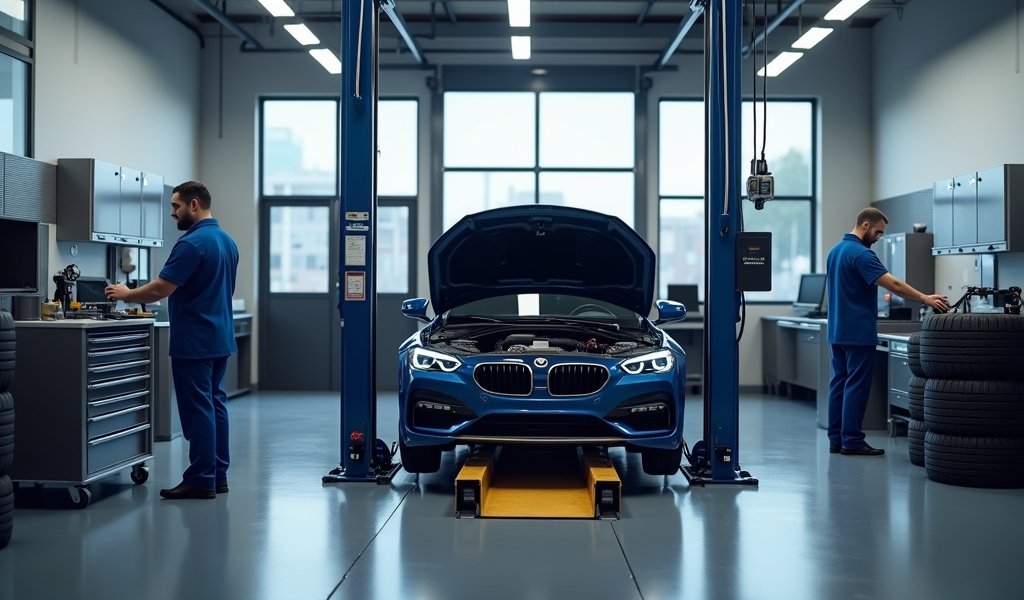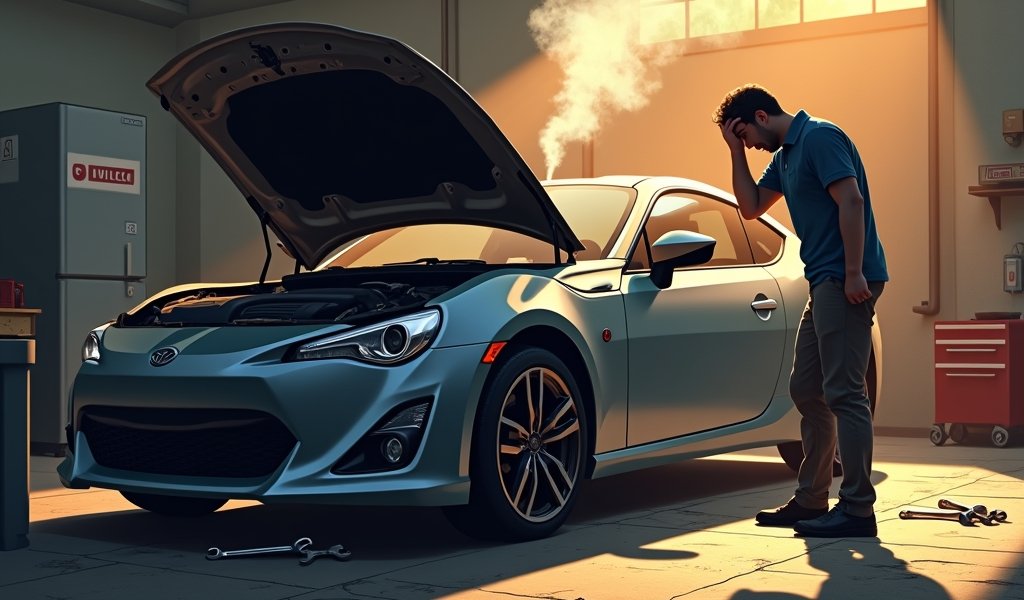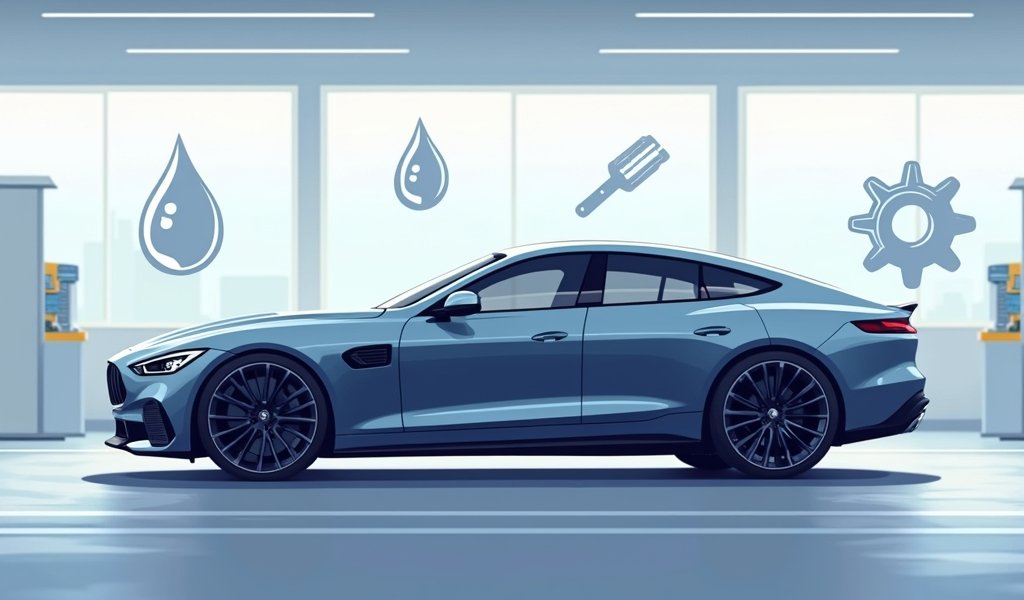Overview
This article provides five key maintenance strategies for new car owners, including proper oil change timing, tire care, fluid monitoring, brake system maintenance, and following manufacturer-specific recommendations. It emphasizes the importance of regular maintenance for preserving vehicle value and performance, particularly for Atlanta drivers facing specific climate challenges, while offering seasonal maintenance tips and digital tools for tracking service schedules.
Table of Contents
- Understanding Your New Car Service Schedule
- The Importance of Regular Maintenance
- Fix #1: Master the Oil Change Timing
- Fix #2: Don’t Neglect Tire Maintenance
- Fix #3: Keep Fluids at Optimal Levels
- Fix #4: Monitor Your Braking System
- Fix #5: Follow Manufacturer-Specific Recommendations
- Using Digital Tools to Track Maintenance
- Seasonal Considerations for Atlanta Drivers
- Conclusion
- Frequently Asked Questions
Understanding Your New Car Service Schedule
When you drive off the lot with that shiny new vehicle in 2024, the last thing on your mind is probably maintenance. But understanding your new car service schedule from day one is crucial for keeping your investment running smoothly for years to come. Here in Atlanta, where we experience everything from scorching summers to occasional winter freezes, your vehicle faces unique challenges that make proper maintenance even more important.
Every new car comes with a manufacturer-recommended service schedule that’s specifically designed to maximize performance and longevity. Think of it as your vehicle’s personal health plan. Follow it diligently, and you’ll likely enjoy years of trouble-free driving. Ignore it, and you might find yourself dealing with preventable issues that could lead to costly repairs down the road.
As a mechanic who’s been working in Atlanta for over 15 years, I’ve seen firsthand how proper maintenance can make all the difference. Let’s dive into five proven fixes that will help you stay on top of your new car service schedule and keep your vehicle running at its best.
The Importance of Regular Maintenance
Before we jump into specific fixes, let’s talk about why sticking to your car maintenance schedule by mileage is so important. Modern vehicles are technological marvels, with sophisticated systems designed to work in harmony. When one component starts to falter, it often creates a domino effect that impacts overall performance.
Regular maintenance isn’t just about preventing breakdowns—it’s about preserving value. A well-maintained vehicle can fetch significantly more when it comes time to sell or trade in. According to a Kelley Blue Book study, proper maintenance can preserve up to 50% more of your car’s value over five years.
In Atlanta’s climate, where summer temperatures regularly exceed 90°F and humidity levels soar, your vehicle faces additional stress. Air conditioning systems work overtime, cooling systems are pushed to their limits, and rubber components age faster. All these factors make following a proper maintenance schedule even more critical for local drivers.

Fix #1: Master the Oil Change Timing
The foundation of any new car service schedule is the oil change. Despite advances in engine technology and synthetic oils, this remains the single most important maintenance task. For most new vehicles in 2024, manufacturers recommend oil changes every 7,500 to 10,000 miles. However, here in Atlanta, where stop-and-go traffic and high temperatures are common, you might want to err on the conservative side.
The key is understanding what type of driving you do most. If your commute involves primarily highway miles in moderate temperatures, you can likely stick to the manufacturer’s recommended intervals. But if you’re dealing with short trips, frequent idling in traffic, or extreme temperatures (both hot and cold), consider shortening those intervals by about 25%.
Modern vehicles make this easier with oil life monitoring systems that analyze your driving habits and conditions to provide a more accurate recommendation. These systems take into account factors like:
- Engine temperature variations
- Cold starts vs. warm starts
- RPM ranges during operation
- Trip duration and frequency
- Environmental conditions
Don’t ignore these systems—they’re surprisingly accurate. That said, it’s still wise to visually check your oil level monthly, especially in older vehicles. Dark, gritty oil that’s below the minimum mark on the dipstick is telling you something important, regardless of what your mileage tracker says.
Fix #2: Don’t Neglect Tire Maintenance
Tires are your only point of contact with the road, yet they’re often overlooked in basic maintenance routines. Your new car service schedule should include regular tire care, which goes beyond just checking pressure once in a while.
For Atlanta drivers, tire maintenance is particularly important due to our mix of rainy conditions and hot pavement. In 2024, with many new vehicles featuring advanced safety systems that rely on optimal tire performance, proper tire maintenance is more critical than ever.
A comprehensive tire maintenance routine includes:
- Monthly pressure checks (including the spare)
- Rotation every 5,000-7,000 miles
- Alignment checks at least once a year
- Tread depth monitoring (the penny test is still relevant!)
- Visual inspection for damage, uneven wear, or embedded objects
Did you know that properly inflated tires can improve your fuel economy by up to 3%? That adds up over time, especially with today’s fuel prices. Modern vehicles often come with tire pressure monitoring systems (TPMS), but these typically only alert you when pressure drops significantly below recommended levels. For optimal performance and safety, keep tires inflated to the pressure listed on your driver’s door jamb, not the maximum PSI printed on the tire itself.
Another often-overlooked aspect is seasonal tire considerations. While Atlanta doesn’t face extreme winter conditions, our occasional freezing rain and light snow events can be treacherous. All-season tires with good tread depth are generally sufficient, but make sure they’re in excellent condition before winter arrives.
Fix #3: Keep Fluids at Optimal Levels
Your new vehicle depends on a variety of specialized fluids to function properly, and how often you should service your car depends partly on these fluid conditions. While oil gets most of the attention, several other fluids are equally important to your vehicle’s health and performance.
In Atlanta’s climate, fluid maintenance takes on added importance. Our hot summers can accelerate fluid breakdown, while humidity can introduce moisture into systems designed to remain dry. Here’s a rundown of essential fluids to monitor as part of your new car service schedule:
- Transmission fluid: Modern automatics often claim “lifetime” fluid, but in practice, most benefit from service every 60,000-100,000 miles, especially in our hot climate.
- Coolant/antifreeze: Prevents overheating and freezing while providing corrosion protection. Most new vehicles use extended-life coolant good for 5 years/100,000 miles, but levels should be checked regularly.
- Brake fluid: Hygroscopic by nature, meaning it absorbs moisture from the air over time. Service every 2-3 years is recommended regardless of mileage.
- Power steering fluid: Often overlooked until problems arise. Check levels monthly and look for discoloration or a burning smell.
- Windshield washer fluid: Simple but essential, especially during pollen season in Atlanta. Use a quality fluid with bug-removing properties.
When checking fluids, don’t just look at levels—pay attention to condition. Discoloration, unusual smells, or particles in the fluid are warning signs that shouldn’t be ignored. For example, transmission fluid should be bright red to light brown—if it’s dark brown or has a burnt smell, that’s a red flag even if the level is correct.
According to the Car Care Council, fluid-related issues account for a significant percentage of preventable vehicle breakdowns. Taking a few minutes each month to check fluid levels can save you from being stranded on I-285 during rush hour.
Fix #4: Monitor Your Braking System
Your braking system is arguably the most critical safety feature in your vehicle, yet many drivers wait until they hear squealing or grinding before paying attention to it. A proactive approach to brake maintenance should be a cornerstone of your new car service schedule.
For 2024 models, many vehicles now come with more sophisticated braking systems that integrate with advanced driver assistance features. These systems require proper maintenance not just for stopping power, but to ensure all safety features function as designed.

Fix #5: Follow Manufacturer-Specific Recommendations
While general maintenance principles apply to all vehicles, manufacturer-specific requirements can vary significantly. Your new car service schedule should be built around the recommendations in your owner’s manual, which often include maintenance items you might not think about.
In 2024, with increasing vehicle complexity and specialization, following these specific guidelines is more important than ever. From direct-injection engines to dual-clutch transmissions, modern vehicles often have unique maintenance needs that generic advice doesn’t cover.
Some manufacturer-specific items that might be included in your service schedule:
- Fuel filter replacement (particularly important for turbocharged engines)
- Spark plug intervals (which can range from 30,000 to 100,000 miles depending on the vehicle)
- Timing belt or chain service (a critical and expensive repair if neglected)
- Battery service for hybrid systems
- Calibration of advanced driver assistance systems
- Software updates for vehicle control modules
Many 2024 models also have specific break-in procedures for the first 1,000 miles. Following these recommendations can significantly impact long-term reliability and performance. Your dealer should provide this information at purchase, but it’s also detailed in your owner’s manual.
Here in Atlanta, where we have many specialized dealerships and independent shops that focus on specific makes, finding qualified service for your particular vehicle is relatively easy. I recommend establishing a relationship with a shop that specializes in your vehicle brand, as they’ll be most familiar with common issues and service requirements specific to your model.
Using Digital Tools to Track Maintenance
In 2024, keeping track of your new car service schedule is easier than ever thanks to digital tools. Many newer vehicles have built-in maintenance trackers that alert you when service is due based on actual vehicle data rather than just mileage or time intervals.
Beyond factory systems, there are numerous smartphone apps designed to help you track maintenance. These range from simple reminder systems to sophisticated tools that can connect to OBD-II ports and provide real-time data about your vehicle’s health. Some of my favorites include:
- AUTOsist
- Car Maintenance Reminder
- aCar
- CARFAX Car Care
These apps allow you to set reminders, track expenses, store service records digitally, and even receive notifications when recalls affect your vehicle. For Atlanta drivers who might visit different service providers for different needs (perhaps the dealer for warranty work, a trusted independent for regular maintenance, and a specialized shop for performance upgrades), digital tracking provides continuity in your service history.
Maintaining comprehensive service records isn’t just about staying organized—it can significantly impact resale value. A complete digital service history that shows regular maintenance performed on schedule can add hundreds or even thousands of dollars to your vehicle’s value when it comes time to sell.
Seasonal Considerations for Atlanta Drivers
While Atlanta enjoys a relatively mild climate compared to many parts of the country, we do experience seasonal changes that should factor into your maintenance planning. Adapting your new car service schedule to account for these seasonal shifts can prevent problems and extend the life of various components.
Spring in Atlanta brings pollen—and lots of it. This golden dust doesn’t just affect allergies; it can clog air filters and impact your HVAC system. A springtime maintenance check should include:
- Replacing cabin air filters
- Checking and cleaning A/C condensers
- Inspecting wiper blades after winter use
- Checking alignment after winter pothole season
Summer brings heat and humidity, which can be tough on your vehicle’s cooling system and battery. Before temperatures soar:
- Have your cooling system inspected
- Check battery condition (heat accelerates battery deterioration)
- Ensure A/C performance is optimal
- Check tire pressure as temperatures rise
Fall is the perfect time to prepare for occasional winter weather events:
- Check heater performance
- Test battery and charging system
- Inspect tires for adequate tread depth
- Replace wiper blades if needed
Winter, while mild compared to northern states, still brings challenges:
- Keep fuel tanks at least half full to prevent moisture accumulation
- Check tire pressure more frequently (pressure drops in colder temperatures)
- Ensure all exterior lights are functioning properly during shorter daylight hours
- Consider a fuel system treatment to prevent moisture-related issues
By adjusting your maintenance focus seasonally, you’ll address potential problems before they affect your vehicle’s performance or reliability.
Conclusion
Maintaining your new car according to a proper service schedule doesn’t have to be complicated or overwhelming. By implementing these five proven fixes—mastering oil change timing, prioritizing tire maintenance, monitoring fluid levels, staying on top of brake system health, and following manufacturer-specific guidelines—you’ll be well on your way to ensuring your 2024 vehicle stays reliable for years to come.
Here in Atlanta, our specific climate and driving conditions create unique challenges that make regular maintenance even more important. From dealing with stop-and-go traffic on the Perimeter to handling summer heat waves, your vehicle faces stresses that proper service can help mitigate.
Remember that the most expensive maintenance is the maintenance you skip. Small investments in regular service pay dividends in reliability, safety, performance, and resale value. Your new car is a significant investment—protect it with a consistent maintenance approach based on these proven strategies.
As we say in the shop, “You can pay a little now, or a lot later.” By following a comprehensive new car service schedule, you’re choosing the smarter, more economical path to long-term automotive satisfaction.
Frequently Asked Questions
How often should I service my new car?
Follow your manufacturer’s recommended intervals, typically every 5,000-10,000 miles for basic service. Most 2024 models have onboard systems that will alert you when service is due based on your actual driving conditions.
Can I skip scheduled maintenance without voiding my warranty?
Skipping scheduled maintenance can potentially void portions of your warranty if the neglect directly causes a failure. Always keep records of all maintenance performed, even if you do some tasks yourself.
Are dealer services worth the higher cost for new cars?
During the warranty period, dealer services ensure all work is documented and performed to factory specifications. After warranty expiration, independent specialists can often provide equivalent service at lower costs.
How do Atlanta’s hot summers affect my service schedule?
Our hot climate accelerates fluid breakdown and battery wear, potentially requiring more frequent service intervals. Pay special attention to cooling system maintenance and battery condition during summer months.
Should I follow the “severe conditions” maintenance schedule in my manual?
For most Atlanta drivers, the severe conditions schedule is appropriate due to our stop-and-go traffic, hot climate, and high humidity. When in doubt, choosing the more conservative maintenance schedule provides better long-term protection.

